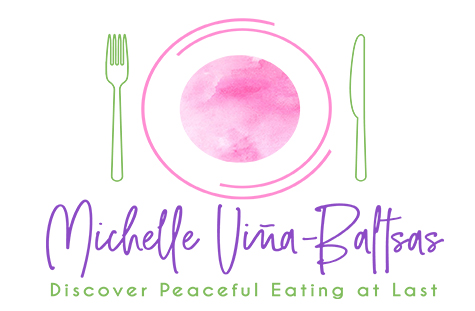It’s the most wonderful time of the year! Or, is it? Let’s face it, as fun as the holiday season can be, it can also be very stressful, especially for those who struggle in their relationships with food. Overeating (defined as eating to an uncomfortable fullness level) during the holidays and then worrying about imminent weight gain are real concerns for a huge majority of the population. So, if you’re feeling this way, understand that you’re not alone.
I know this because during the year, I help people overcome their struggles with food, specifically with binge eating, chronic emotional overeating, and food restriction by teaching them about intuitive eating. Intuitive eating is a process where you learn how to listen to your body’s internal signals for hunger, fullness and food satisfaction. Over time, my clients see that many of the things they’ve been doing to help control their eating (and weight) is what’s causing them to feel uncontrolled and dissatisfied with their eating in the long run.
Regardless if you’re a seasoned intuitive eater or never practiced intuitive eating before, the tips I’m sharing will help you feel more confident and less stressed around your holiday eating.
The truth is that it’s difficult to fully enjoy the holidays when you’re worried about what you’re eating, how much you’re eating, and how all of that will impact your waistline. You don’t have to feel stressed or wallow in food guilt this holiday season if you remember and practice the 3 Ps:
Permission
Instead of restricting your favorite foods because they’re too fattening or have too many carbs, eat them instead. I know it may sound crazy, but restricting foods often leads to overeating or even bingeing. So, giving yourself permission to eat all foods (unless there is a food allergy or sensitivity to it) is less likely to make you overeat them. Believe it or not, food doesn’t seem as “taboo” when we give ourselves permission to eat it. It is making the foods scarce or “forbidden” in our minds that intensifies us wanting them even more.
Pleasure
When choosing foods to eat, eat your favorites first. So, take some time to visually scan what’s available to you and then go for it! Don’t save the best for last. Eat those foods first so you can savor them now. There is no reason to postpone joy, especially if there is a limited quantity of it.
Presence
As often as possible, be present or mindful while eating. I know it’s a busy time of year! Schedules are packed, and often emotions are running high. But as often as possible, be intimate with your food. By that I mean, be deliberate about the foods you choose to eat. When the food hits your tongue, let the flavors and textures take hold. After chewing your food well (which helps with digestion), and swallowing it, ask yourself if the food was satisfying to you before you take another bite. It’s amazing how often we just eat food because it’s on our plate, but the food really isn’t satisfying to us. So, take time to ask yourself if the foods you’re eating are satisfying you. The truth is, often when we’re eating satisfying foods, we often eat less of them.
I’m confident if you keep these three Ps in mind, you’ll experience less stress and more joy in your holiday eating. Also, no matter where you are on your journey with food, give yourself permission to eat “imperfectly”. At any time of the year, striving for perfectionism isn’t good. It breeds rigidity and that often leads to more stress, often more overeating, and more food guilt. Practicing self-compassion when we notice these perceived imperfections allows us to be more present and mindful in our lives because we stop judging ourselves so much. When we’re doing this, we can truly enjoy the gifts of the holiday season and beyond.



